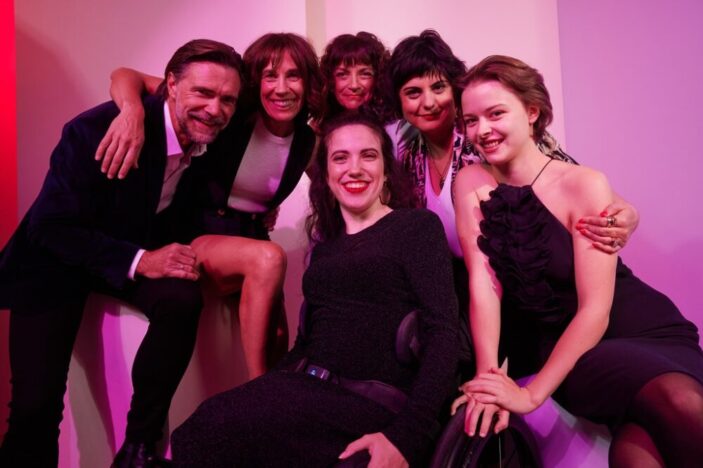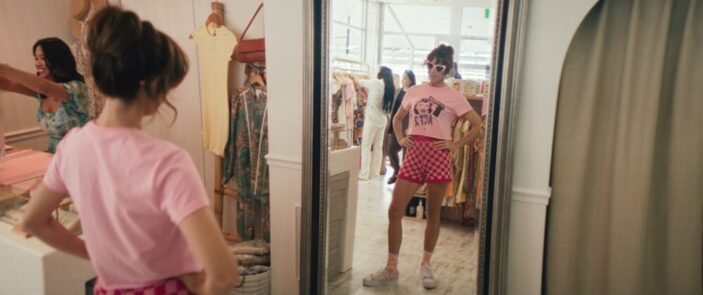
After impressing festival audiences with its acerbic humour, Audrey is a twisted, razor sharp film, both gloriously absurd and strangely relatable. Its black comedy at its best, inspired by modern classics like Muriel’s Wedding and Jennifer’s Body.
With New Zealand’s funniest export leading the charge, alongside Australian screen veterans and emerging stars, Audrey is far from your average mother-daughter flick. Forgotten soap star and self-appointed Mother of the Year, Ronnie Lipsick (Jackie van Beek) is trapped in a life of unfulfilled dreams and suburban monotony. With a stalled acting career due to an early pregnancy, a disengaged husband, and an unappreciative family, Ronnie’s ambitions seem lost. However, when an accident puts her eldest daughter, Audrey (Josephine Blazier), into a convenient coma, Ronnie seizes the opportunity to step into Audrey’s shoes and pursue the stardom she was made for.
Also exploiting Audrey’s absence for their own gain, Ronnie’s husband Cormack (Jeremy Lindsay Taylor) reawakens his long lost mojo and lust for life with a job producing Christian themed porn, whilst daughter Nora (Hannah Diviney) revels in the attention from Audrey’s friends and boyfriend. Everybody’s life seems better without Audrey in it – until the inevitable chaos ensues once she wakes up, of course.
A unique Australian brand of humour that’s absurdly entertaining, Audrey is sure to have audiences talking when it opens in Australian theatres this week. And responsible for such humour are director Natalie Bailey and screenwriter Lou Sanz, who joined our own Peter Gray for a spirited chat (some of which couldn’t be printed) about the film’s inspiration, the delight they have found in tapping into the dark side of their viewers’ psyches, and the commitment from its game cast.
I spoke to Jeremy Lindsay Taylor about his role in this film, and he’s not that well known for comedy, obviously he’s started to do a little more lately, but he’s primarily known as a dramatic actor. Was he the first person that came to mind for this rather bizarre role? It’s just so unexpected!
Natalie Bailey: I’ll be honest with you, I’ve been away for a very long time from Australia, and only back for a few years (and) my head is not around as much as it should be. Lou is much better at knowing (the actors). She’s really good in that aspect. To me he was actually a fresh face (laughs), which seems shocking, but it’s just because I was away for such a long time living in England. I was just blown away by him. He came and auditioned for it. He did a tape, and he just nailed it. He was so, so good. And he really wanted the role. He told us that he understood (this character). The thing about Jeremy is that we’ve never been able to see what’s he capable of, so (Audrey) is exciting.
Lou Sanz: Yeah, he was so amazing. And I did that moment of, “Oh, it’s Kurt from Heartbreak High.” There’s the storyline in the film that (his character) Cormac writes his own script, and Jeremy asked if he could actually write it, as a type of a character exercise. He read it to me in character, and I was sitting there opposite him, having my brain do this thing where I’m like, “It’s Jeremy Lindsay Taylor. He was in Heartbreak High. He’s in this movie. He’s in character.” I had to be so present. But you see the film and you understand what I’m talking about. My partner is a bisexual man, and he struggles to see representation done in a really respectful way, so in a weird way Audrey is this love story.
And the things about Jeremy is he plays sad clown so well, but then he can become a hot guy, you know the transformation from sad clown to that body. He’s such a beautiful actor.
Look, I’m not here to objectify Jeremy Lindsay Taylor, but *chef’s kiss*. I was not mad.
Lou Sanz: (Laughs) When we were on set, somebody pulled me aside when we were doing the bathroom scene, and they just went, “You’re doing God’s work.”
Natalie Bailey: But that’s the thing, you know, that transformation. It’s a beautiful character in Lou’s script, and Jeremy just brings it to life. We couldn’t have asked for anyone better. He nailed that role so beautifully.
Going off that notion, you have Jackie van Beek. She’s so divine in this film. With her background as a writer and director, did it ever feel like there was maybe some pressure from her looking at the two of you through eyes that weren’t solely as an actress?
Natalie Bailey: Never. She just surrenders to it. I was slightly worried, as I’m sure Lou was, because you do think she might want to control from the inside. And that can be great, but it can also be problematic, because you want everything to be coming from the heart. But it was such a collaborative process, and (Jackie) just gives over to it. She’s not afraid to take risks. And that’s the most amazing thing about her. She knows what it’s like to be a director. She knows what it’s like to be a writer. And she respects those roles so much.

With the film itself, it’s so fucked up, but I loved it. I didn’t know where it was going. When I read about it I saw that Muriel’s Wedding, To Die For and Jennifer’s Body were inspirations, and after seeing the film that all makes sense. But where did the idea of Audrey originate from? Is there real-life experiences drawn from? Real people?
Lou Sanz: When I first started working on it, I was really into Nora. She was the character I identified with the most, just with her relationship with her sister, and I wanted to play with that outsider character a lot. We really came at the story through her eyes. As I got older, and my scripts often grow with me, Ronnie started to come to bear. I was thinking, “Oh, I’m becoming a mother.” My career kind of just stopped and started and stopped and started. I wanted different things. And Ronnie is still an outsider.
One of the things I loved about this is that these characters are saying the types of things you know they shouldn’t say, even though we’ve probably all had those thoughts. Ronnie’s daughter being in an accident making their lives better brings about the darkest nature of people, and we’d be lying if we didn’t say we all have a variation of darkness within us.
Natalie Bailey: I remember those thoughts. Not as a parent, but in situations where I thought, “It would be better right now to just drive this car into a wall and kill us both.” That person is pissing you off. You want the argument to stop. We’ve had those moments. In the darkness of that (though) is the trauma that’s really interesting. This is a traumatic situation. Someone’s child has had an accident and gone into a coma. People do not behave how you think they will when they’re in a trauma. Some do. Most people do not. And this film reflects that.
With everything that you’re tackling in the film, did any of the material result in any type of pushback? Or was your vision left intact?
Natalie Bailey: The only thing was the showing of penis. And I actually felt that it was important. Female nudity and a male’s bare chest is not showing any nudity, apparently. A key thing for me and Lou was that we wanted this film to be very real and to show real bodies. That was really important. We have a Christian porn plot here, and I think a lot of younger people think their bodies should be a certain way, and what we see on screen affects people’s expectations and their sex life. We put this pressure on ourselves in how we look. It’s so nice to represent real people on screen. And we shot this with as little limitation as possible. The first cut was as close to full nudity as possible. We had full male nudity. I mean, equal rights and equal representation? But we were warned during a test screening that people found it too much. We knew we’d be excluding an audience if we went with it and got an R rating. It’s a shame though.
Lou Sanz: The other thing we got pushback on was Jeremy’s opening scene. Again, they thought the audience might be worried about him being likeable because of his relationship with sex toys, but we needed to let them know what type of movie this is from the beginning.
Natalie Bailey: And with (Jeremy’s character) it’s hopefully clear enough that it’s not so much that his wife can’t pleasure him, it’s that being a parent has made him not be able to fully be as sexual as he would want. He doesn’t know how to revive that engine. And how do you rev that engine with so much repression?
Lou Sanz: But getting everyone on our side and making the audience complicit is a really good thing because we also don’t want to give the audience a “Get out of Jail free card” and have them thinking that we just went off and did the third act all on our own. It’s like, “No, no, no. At some point, you (the audience) all came along with us.”
If the audience are laughing, they are absolutely on your side and they know they can’t turn back. If they have laughed at every single dark joke, they can’t turn around on the fact that this film commits to such an ending as it does.
Lou Sanz: Yeah, Natalie and I will just stand out the front of every session as they walk out and say “Fuck you.” (Laughs)
I feel like there’s no better way to end this now.
Audrey is screening in Australian theatres from November 7th, 2024.
